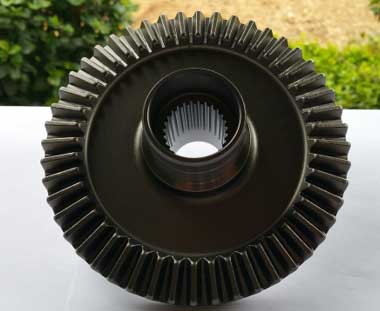Influence of Precision Metal Shims on the Performance of Differential Gear Assemblies
To fully understand the impact of precision metal shims, it’s crucial to first comprehend the workings of differential gear assemblies. Differential gear assemblies are intricate mechanical systems found in vehicles. They allow the wheels on the same axle to rotate at different speeds, a critical feature when navigating turns. A differential gear assembly’s primary function is to transmit torque from the engine to the wheels while permitting them to rotate at different speeds.
Differential gear assemblies consist of several components, each playing a crucial role in its overall efficiency and performance. These components include the differential case, ring gear, pinion gear, spider gears, and side gears, among others. The assembly’s effective operation depends largely on the harmony and precision of these components working together.
The precision in the assembly of these components is paramount. Even the slightest misalignment or discrepancy in thickness can cause significant issues, such as gear noise, excessive wear, and eventual failure of the assembly. This is where precision components, such as precision metal shims, come into play.
What are Precision Metal Shims?
Precision metal shims are thin pieces of metal used to fill small gaps or spaces between two components in a mechanical assembly. They’re used to ensure precise alignment, adjust the fit of components, or establish specific distances within an assembly. Precision metal shims are commonly used in a variety of industries, including automotive, aerospace, and industrial machinery.
Precision in the manufacture of metal shims is critical. The exact thickness, flatness, and parallelism of the shim can significantly impact the performance of the mechanical assembly in which they are used. Given their role in maintaining precise alignments and distances, any error in the manufacture of a shim can lead to malfunctions or failures.
The materials used to manufacture precision metal shims vary based on the application. Common materials include steel, stainless steel, brass, copper, aluminum, and various alloys. Each material offers distinct properties, such as strength, corrosion resistance, and thermal conductivity, making them suitable for different applications.
The Role of Precision Metal Shims in Differential Gear Assemblies
In differential gear assemblies, precision metal shims play a critical role. They are used to establish the precise alignment and spacing of the various gears within the assembly. By ensuring proper alignment and spacing, shims help reduce friction and wear between the gears, thereby enhancing the lifespan and performance of the differential gear assembly.
For instance, shims are used to adjust the backlash between the ring and pinion gears in a differential. Backlash is the amount of play or movement that exists between these gears when the direction of drive is reversed. Too little backlash can cause the gears to bind and overheat, leading to premature wear or failure. Conversely, too much backlash can cause gear noise and excessive wear.
Moreover, precision metal shims are also used to set the bearing preload in a differential. Bearing preload is the amount of force or load applied to the bearings when they are installed. An accurate preload is crucial for the optimal operation of the bearings and, by extension, the differential gear assembly.
The Influence of Precision Thickness in Metal Shims
The precision thickness of metal shims is a critical factor in their effectiveness. In differential gear assemblies, the thickness of the shims can significantly influence the performance and lifespan of the assembly.
The thickness of a shim determines the amount of space it fills within the assembly. In the context of a differential gear assembly, the thickness of shims used to adjust the backlash between gears or set the bearing preload directly impacts these parameters. If the shim is too thick or too thin, it can lead to improper backlash or preload, respectively, resulting in reduced performance and potentially leading to premature failure of the assembly.
Moreover, the thickness of the shim also affects its strength and stiffness. A thinner shim may flex or deform under load, while a thicker shim will be stiffer and more resistant to deformation. This can influence the shim’s ability to maintain precise alignments and spacings within the assembly, which ultimately impacts the performance of the differential gear assembly.
Importance of Precision in High Volume Shim Manufacture
Given the critical role of precision metal shims in differential gear assemblies, the precision in their manufacture, especially in high volume production, cannot be overstated. High volume shim manufacture involves the production of a large number of shims in a relatively short period. This process demands a high level of precision to ensure that every shim produced meets the specified tolerances.
Precision in high volume shim manufacture is achieved through the use of advanced manufacturing techniques and equipment. Processes such as stamping, laser cutting, and waterjet cutting are commonly used to create metal shims with high precision. These techniques allow for the production of shims with tight tolerances in thickness, flatness, and parallelism.
Furthermore, quality control measures play a vital role in ensuring precision in high volume shim manufacture. Techniques such as optical measuring, coordinate measuring machines (CMM), and digital micrometers are used to inspect and verify the dimensions of the shims. Any shim that does not meet the specified tolerances is discarded, ensuring that only shims of the highest quality are used in differential gear assemblies.
Precision Metal Shims Enhance Performance of Differential Gear Assemblies
Precision metal shims enhance the performance of differential gear assemblies in several ways. Firstly, they ensure proper alignment and spacing of the gears within the assembly. This reduces friction and wear between the gears, enhancing their lifespan and performance. Additionally, proper alignment and spacing reduce noise generated by the assembly, leading to a quieter operation.
Secondly, precision metal shims are instrumental in setting the backlash and bearing preload within the assembly. By allowing for precise adjustments of these parameters, shims help optimize the operation of the assembly, enhancing its efficiency and performance.
Lastly, the use of precision metal shims helps prevent premature failure of the differential gear assembly. By ensuring accurate alignments, spacings, and adjustments, shims reduce the likelihood of abnormal wear or damage to the gears and bearings in the assembly. This extends the lifespan of the assembly and reduces the need for costly repairs or replacements.
Successful Use of Precision Metal Shims in Differential Gear Assemblies
To highlight the significance of precision metal shims in the performance of differential gear assemblies, consider the case of a leading automotive manufacturer. The manufacturer had been experiencing issues with the differential gear assemblies in their vehicles, including excessive noise and premature wear.
Upon investigation, it was discovered that the root cause of these issues was the improper alignment and spacing of the gears within the assembly. This was attributed to the use of poor-quality shims that did not meet the required tolerances.
The manufacturer turned to a specialist in precision metal shim manufacture. The specialist provided high-quality, precision shims that were used in the differential gear assemblies. Subsequently, the manufacturer reported a significant reduction in gear noise and an extended lifespan of their differential gear assemblies. This case serves to underscore the crucial role that precision metal shims play in the performance of differential gear assemblies.
Finding Quality Precision Metal Shims for Differential Gear Assemblies
Given the importance of precision metal shims in the performance of differential gear assemblies, finding a reliable source for high-quality shims is crucial. When selecting a shim manufacturer, consider factors such as the manufacturer’s experience, manufacturing capabilities, quality control measures, and customer service.
Look for a manufacturer that specializes in precision metal shims and has a proven track record in the industry. The manufacturer should have the capabilities to produce shims with high precision, using advanced manufacturing techniques. They should also have stringent quality control measures in place to ensure that every shim produced meets the specified tolerances.
Furthermore, a good manufacturer will work closely with their customers to understand their specific needs and provide custom solutions. They should be willing to provide samples, offer technical support, and provide timely delivery of orders. By carefully selecting a shim manufacturer, you can ensure that you receive high-quality, precision metal shims that enhance the performance of your differential gear assemblies.
Future Trends in Precision Metal Shim Use in Differential Gear Assemblies
Looking towards the future, the use of precision metal shims in differential gear assemblies is likely to continue to evolve. As vehicle technology advances, the demand for higher performance and efficiency will drive the need for even greater precision in the manufacture of metal shims.
One trend that is likely to gain traction is the use of advanced materials for the manufacture of shims. Materials such as high-strength alloys and composites offer superior properties, including strength, stiffness, and wear resistance. These materials could potentially enable the production of thinner, lighter, and more durable shims.
Additionally, the use of digital manufacturing techniques such as additive manufacturing (3D printing) may revolutionize the production of precision metal shims. These techniques allow for the production of shims with complex geometries and tight tolerances, potentially enhancing the performance of differential gear assemblies further.
Precision Metal Shims for Differential Gear Assemblies | Michigan
In conclusion, precision metal shims play a critical role in the performance of differential gear assemblies. They ensure proper alignment and spacing of the gears, optimize backlash and bearing preload, and prevent premature failure of the assembly. The precision in the manufacture of these shims, particularly in high-volume production, is paramount. As differential gear assemblies evolve, the demand for high-quality, precision metal shims will continue to grow.
By understanding the importance of these vital components and ensuring their quality, manufacturers can enhance the performance and longevity of their differential gear assemblies. If you’re in the market for differential gear assemblies, precision metal shims, precision thickness, or high volume shim manufacture, don’t hesitate to reach out to our team for guidance and support.
Northern Industrial Manufacturing is your turnkey partner for even the most challenging projects. Our experts understand which options work best for your specific material and surface finish requirements, and offer the most advanced technologies to meet the needs of your unique project. We will bring your parts to market on time – with assistance from prototype to volume production – quickly, affordably and efficiently as possible.
Thank you for visiting our blog where we keep customers updated and informed on the latest processes in automotive parts manufacturing!
Please check back often if you would like to learn more about the world of precision thrust washers, selective shims, spacers, and other automotive parts.




